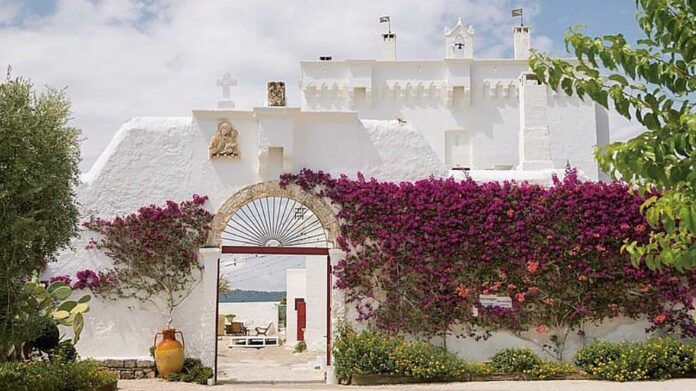Emblem of the rural civilization, intimately connected to the history of the Apulian territory, today masserie have been transformed into charming homes, to experience the most authentic Apulia and to immerse oneself in its food and wine culture.
Anyone who is about to book a vacation in Apulia, or is reading some article about this wonderful region, will inevitably find a picture of a masseria. But what exactly are masserie? They are charming residences, hotels and resorts that dot the entire region, from Salento to the Murge, to the Itria Valley. Today they represent the quintessential Apulian hospitality: white stone dwellings, often surrounded by fragrant aromatic gardens, embraced by a landscape dominated by vines and olive trees, and cooled by a gentle breeze coming from the sea. There are masserie for all tastes, from the most historic ones, which, although they have been restored, retain all the charm of their rural past, for those who prefer the rural-chic style, to the extra luxury ones, with swimming pools, restaurants and golf courses, for those who do not want to give up the ultimate in comfort and relaxation and … the chance to meet VIPs like Madonna, an affectionate customer of a particular masseria in Salento.
But the Apulian masserie have not always been so glamorous: originally, in fact, they were a kind of large farm, which could remind the Mexican haciendas, with rooms for farmers, shepherds and their families, more noble wings, reserved for landowners, stables and sheepfolds, warehouses for tools, ovens and cottages where raw materials were processed. The largest ones also included small chapels, mills and oil mills. There were different types of farms: from masserie a corte, or enclosed by defensive walls, to those made up of many trulli of different sizes. It was a sort of small rural closed world, whose first evidence dates back to the time of the Lombards, but after the last world war, with land reform, lost its role aggregating. Many farms were so abandoned and went to ruin, until, with a targeted action of tourism policy, it was decided to convert most of them in accommodation or restaurants. Today it is a fortune for anyone who visits Apulia, to be able to stay in one of these magical places rich in history, where are often organized tastings of oils and wines, visits to vineyards and oil mills and regional cooking lessons, in order to let visitors and the most attentive tourists discover the culture and tradition of the territory.









